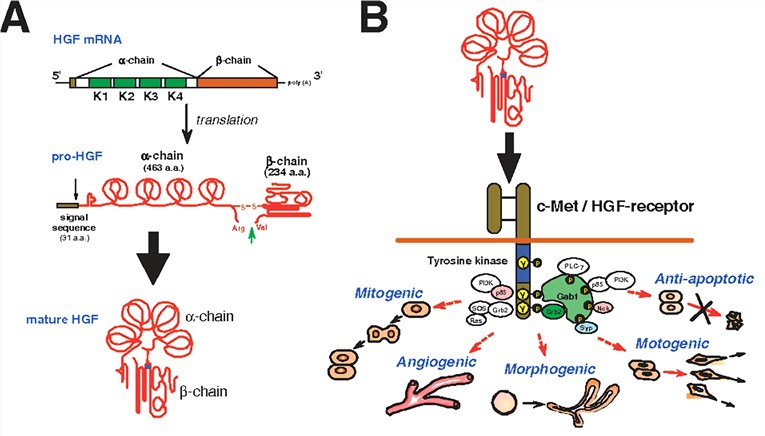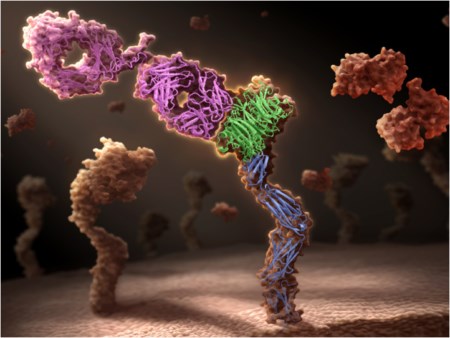Development of HGF-based Bispecific ADCs
Bispecific antibodies (BsAbs) and antibody-drug conjugates (ADCs) have already demonstrated benefits for the treatment of cancer in several clinical studies, showing improved drug selectivity and efficacy. Creative Biolabs is a specialized manufacturer of bsAbs and antibody conjugates based on our advanced technology and years of experience. We are available to supply customized hepatocyte growth factor (HGF)-based bispecific ADC development services for our clients.
The Overview of HGF
HGF is a secreted, heparan sulfate (HS) glycosaminoglycan-binding protein that stimulates mitogenesis, mitogenesis, and morphogenesis in a wide array of cellular targets, including hepatocytes and other epithelial cells, melanocytes, endothelial cells, and hematopoietic cells. HGF is a multi-domain heterodimeric protein, consisting of two α and β subunits linked by a disulphide bond. The α chain is composed of an N-terminal hairpin segment followed by four disulphide-bond-stabilized kringle domains, while the β chain has the structure of a serine protease, but, due to the substitution of three amino acids, is devoid of enzymatic activity. HGF is secreted as an inactive single-chain precursor. In response to tissue injury, pro-HGF is then activated through proteolytic cleavage, to induce a local and transient burst of active HGF that promotes tissue regeneration. Cell surface-bound HGF is internalized and degraded by the receptors, which makes it an attractive target for ADC generation.
 Fig.1 Structure and biological function of HGF. (Nakamura, 2010)
Fig.1 Structure and biological function of HGF. (Nakamura, 2010)
Antibody-based Therapeutics Targeting HGF
Different in vivo studies have shown that activation of the HGF-cMET signaling pathway triggers cancer invasion and metastasis. Several monoclonal antibodies (mAbs) inhibit the HGF-cMET axis by blocking the binding of HGF to cMET or by targeting cMET on the cell surface. Anti-HGF antibodies in development include:
- YYB-101, a humanized rabbit anti-HGF antibody that binds to the HGF α-chain.
- Rilotumumab, a fully human anti-HGF IgG2 antibody that binds to the HGF β-chain, thereby inhibiting HGF-cMET binding.
- Ficlatuzumab, a humanized anti-HGF antibody.
- HuL2G7, a humanized antibody shown to overcome gefitinib resistance in EGFR-mutated human NSCLC cell lines.
Creative Biolabs provides ready-to-use research grade biosimilars anti-HGF ADC products, including anti-HGF (Flanvotumab)-SMCC-DM1 ADC, anti-HGF (Rilotumumab)-SPDB-DM4 ADC, anti-HGF (Ficlatuzumab)-MC-VC-PAB-SN38 ADC, and so forth. If you’re like to find more information please visit our anti-HGF ADC Products.
Nowadays, simultaneous targeting of prominent cancer antigens, such as EGF receptor (EGFR) and HGF, by bsAbs has raised increasing interest for global researchers. Up-regulation and amplification of HGF are regarded as one major escape route during anti-EGFR therapy in non-small cell lung, gastric, and breast cancer. Hence, combining the bsAb approach for targeting HGF and EGFR with the conjugation of potent cytotoxic agents could be advantageous.

What Can We Do for You?
Creative Biolabs generated affinity-optimized bsAbs targeting different epitopes on HGF/EGFR and HGF/VEGF by applying display technologies and in silico screening. The bsAbs and bispecific ADCs were engineered with the strand exchange engineered domain (SEED) technology based on two asymmetric, non-identical CH3 chains. These chains were constructed from alternating segments of IgG and IgA so that heterodimerization is favored.
Creative Biolabs has been involved in the development of ADCs for many years and we are committed to completing your project with high quality. We have constructed two target combinations for HGF-based bispecific ADCs development, HGF x EGFR and HGF x VEGF. Creative Biolabs also provide ADC in vitro Analysis and ADC in vivo Analysis for our clients. For any specified combination, we would like to discuss with you further to obtain the best solution. Please do not hesitate to contact us for more information.
Reference
- Nakamura, T.; Mizuno, S. The discovery of hepatocyte growth factor (HGF) and its significance for cell biology. Life sciences and clinical medicine. Proceedings of the Japan Academy, Series B. 2010, 86(6), 588-610.
For Research Use Only. NOT FOR CLINICAL USE.
Related Sections
Bispecific ADCs Development: Services:
Welcome! For price inquiries, please feel free to contact us through the form on the left side. We will get back to you as soon as possible.
Contact usUSA
Tel:
Fax:
Email:
Europe
Tel:
Email:
Germany
Tel:
Email:

